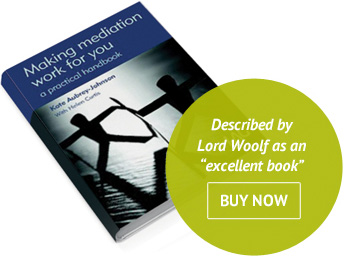BLOG
Mediation – the rational alternative
October 30, 2020
“To remain in conflict with another defies rational scrutiny; to continue in a commercial dispute resists economic analysis” (Strasser and Randolph).
Abigail Holt considers the extent to which human beings are – as The Times journalist, Caitlin Moran has suggested – “a problem-solving species”.
If you were a problem-solving human looking to devise a public system to solve legal disputes from scratch, would you design the system that we currently have with years-long delays? Mounting expense? Complex procedures set out in tomes expressed in impenetrable language? Government and “official” websites which aim to be “user friendly” and to reassure, but effectively disguise the gaps and traps? And now in times of COVID, the courts using electronic platforms where the technology can be capricious; not because the “platform” is particularly difficult to use once installed, but because it won’t “work” with software that is already on a litigant’s computer; downloading problems; licence problems… all resulting in an uncomfortable blur of coffee, confusion and spiking cortisol; a massive disincentive to confronting legal problems.
If you are facing a dispute or legal problem, whether in its embryonic or advanced stage, it is always worth investigating whether mediation might be a better way of ending the problem sooner and more cheaply and in conditions of strict confidence. Not to explore mediation risks unresolved disputes sapping quality and joy out of life leaving parties frustrated and using up time that could be better spent on running businesses, families, lives.
Unfortunately, certain ingredients of the way that legal practice and procedure has evolved over the centuries has engrained the fantasy of a “winner–takes–all” mentality. The psychology of disputes under our current model forces the people involved into a “battle”mentality; to take sides; to build walls; and to start a war of words.
At the same time, the structuring of the way that litigation is conducted has encouraged lawyers to be concerned that they might be negligent if they do not pay extremely close attention to every detail and generally put their efforts into building safer, deeper trenches and more solid walls. Lowering the draw-bridge is mistakenly perceived as weakness.
Yes, this system “defies rational scrutiny” and often encourages illogical behaviour where people end up acting against their own wider-ranging interests; and yes, perpetuated commercial disputes undermine sound economics. But NO, it does not have to be this way!
At Garden Court we have always been at the vanguard of using law inventively; of being resourceful in legal-problem-solving and ingenious in our advocacy; to empower; to protect from abuses of authority and restriction; to promote the health and wellbeing of people and our habitat. Our vision is holistic, knowing that all aspects of human endeavour, including financial relationships, are interrelated. It is therefore entirely natural that Garden Court mediation is at the forefront of providing “preventative” measures focussed on avoiding and containing disputes before more expensive and stressful formal procedures are followed culminating in a decision imposed by a judge sitting in a court.
In contrast to adversarial litigation, mediation is a hugely cost-effective set of skills and techniques which mediators increasingly use to facilitate the ending and resolution of all manner of disputes, whether personal, inter-family, or business, including commercial and cross-border. Our successes largely pass “under the radar” as we respect the strict confidentiality required to create an ambiance of trust within which agreement and compromise can grow.
Mediation can also deliver other advantages that are not available at traditional negotiated settlements of legal cases. Mediation allows for the possibility of finding creative remedies, (including combination of remedies), which a judge is not allowed to order when finalising a case, for example, without prejudice apologies which are private and not to be communicated beyond the parties. Mediation is potentially more flexible than litigation and can address multi-party or contribution proceedings or where there are more than one set of proceedings arising out of the same problem, (such as a workplace accident where the claimant is suing for tort-based damages and also bringing a claim in the Employment Tribunal). Sooner-rather-than-later mediations can lead to massive savings in time, energy and cost.
Of course, it will always be true that certain cases demand a careful, formal judicial appraisal of the evidence, dissected out and presented in relation to the particular legal framework being urged as correct. Equally, straightforward and reasonable “traditional” negotiation will continue to facilitate entirely acceptable access to justice. However, the filters of burden and standard of proof, admissibility, weight of evidence, inflexible costs budgets and proportionality issues applying to the extent of examination of expert evidence, as well as other limiting mechanisms, mean that judge-made decisions are approximations. Further, it is intellectually dishonest to suggest that “traditional” negotiations are a purely dispassionate consideration of the evidence, when they usually end with at least some element of compromise and “splitting the difference”.
It has to be acknowledged that the vast majority of cases do settle in the end, but this is usually when an accumulation of disadvantages forces the parties to acknowledge the risks of continuing to trial. Conversely, the techniques applied by a skilled mediator have the potential to unearth the psychological and other factors that fuel disputes; to build bridges, traverse difficult terrain and chasms; facilitate smooth transitions and even allow for honourable retreat via mediation and Garden Court mediators are experts in this territory. The result for parties who engage in mediation is the ability to confront issues far sooner, explore solutions confidentially and decisively end their dispute.
Shakespeare: “A peace is of the nature of a conquest; for then both parties nobly are subdued, and neither party loser” Henry IV part 2; Act 4, scene 2

